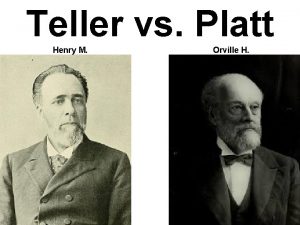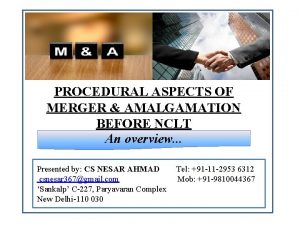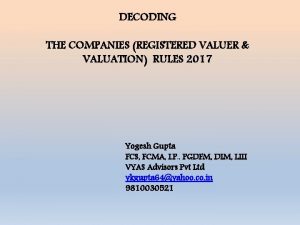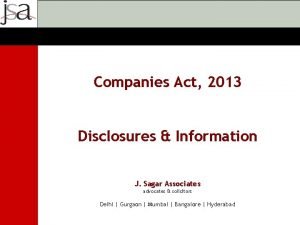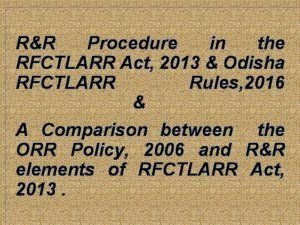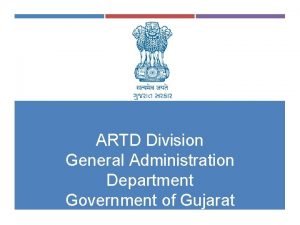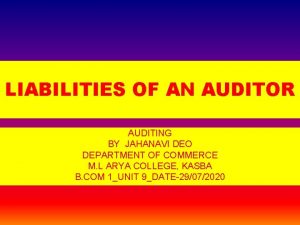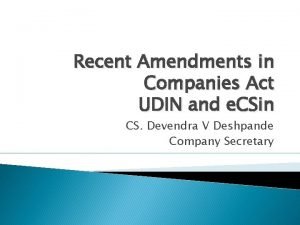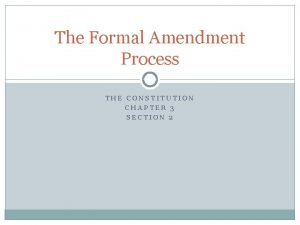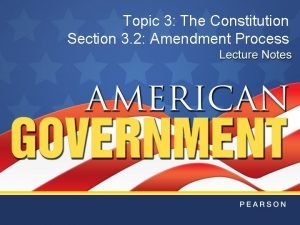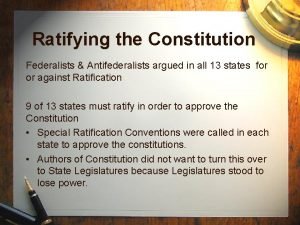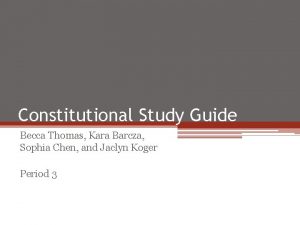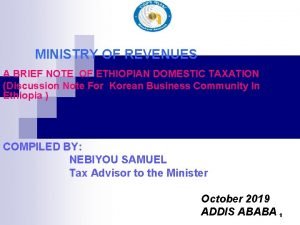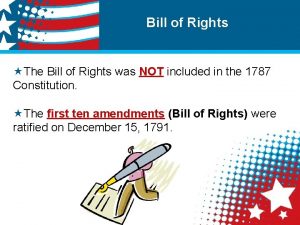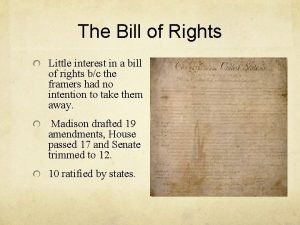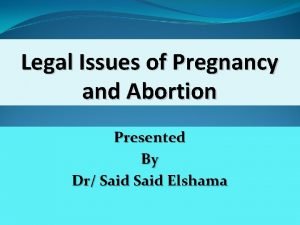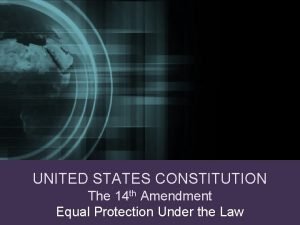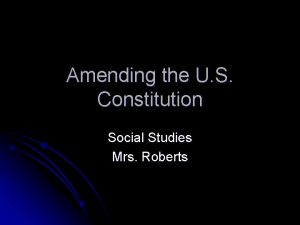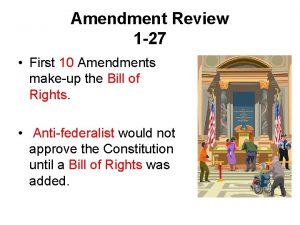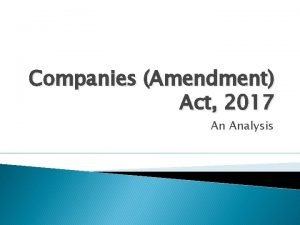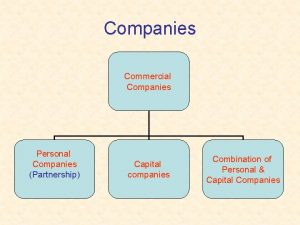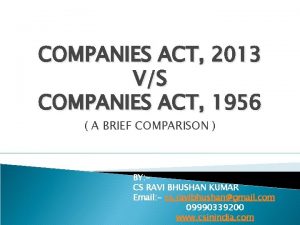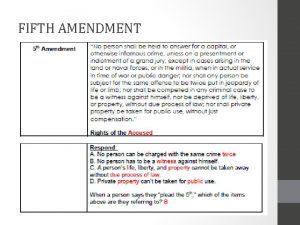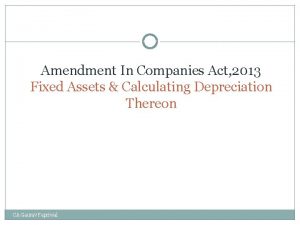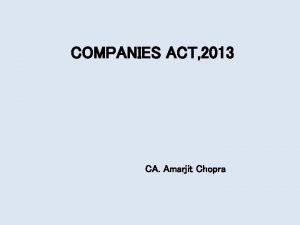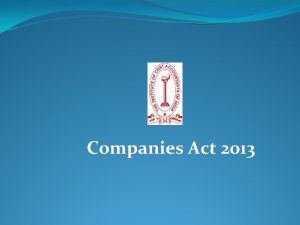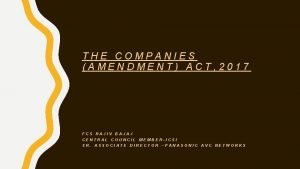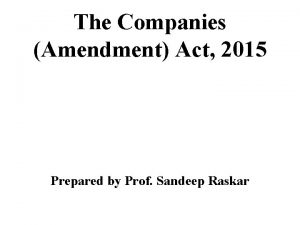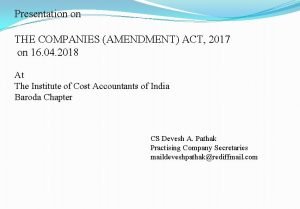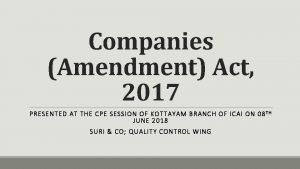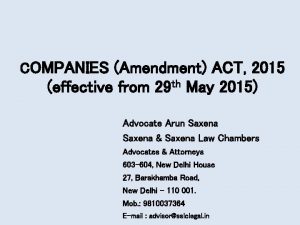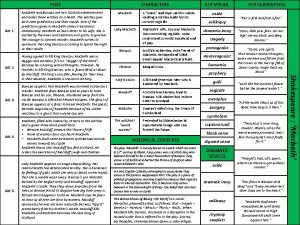THE COMPANIES ACT 2013 THE COMPANIES AMENDMENT ACT






































- Slides: 38

THE COMPANIES ACT, 2013 -THE COMPANIES (AMENDMENT) ACT, 2016 ü Is it Amendment OR is it another Act ? ü At-least 87 sections and equal number of Rules are amended BUT ü Definitely an attempt in the direction of achieving ease of doing business. ü Some wisdom of synchronizing with other Regulators CS Anant Amdekar - ICAI - Andheri Study Circle 5/8/2016 1

KEY HIGHLIGHTS OF THE COMPANIES (AMENDMENT) ACT, 2016 ü The Companies (Amendment) Act, 2016 is the result of the long consultative process undertaken by the Company Law Committee constituted by the MCA in an attempt to revamp the Companies Act, 2013. ü The mandate included – Ø Address issues arising out of implementation of The Companies Act, 2013. Ø Examine recommendations made by Bankruptcy Law Reforms Committee. Ø Suggestions on ease of doing business. Ø Making CSR meaningful. CS Anant Amdekar - ICAI - Andheri Study Circle 5/8/2016 2

CLC Guiding Principles Ø Need to balance the interest of various stakeholders like companies, professionals, investors, regulators, etc. Ø Need to simplify processes or doing away with unnecessary procedures. Ø Need for greater transparency and disclosures in view of lesser regulatory interference and greater self regulation. Ø Bringing greater clarity in language of the provisions of the Act, wherever required. CS Anant Amdekar - ICAI - Andheri Study Circle 5/8/2016 3

CLC Guiding Principles – Cont… �Pros and cons of addressing issues through subordinate legislation i. e. Rules versus amendment in the Act. �Compliance requirements for various class of companies versus public interest. �Levels of punishment for non-compliance and the necessity to improve compliance. CS Anant Amdekar - ICAI - Andheri Study Circle 5/8/2016 4

APPROCH OF DISECTING THE AMENDMENT ACT, 2016 Ø Focus is on certain sections with interpretational aspects Ø Procedural aspects are intentionally omitted as any way they keep on changing very frequently. Ø Efforts are to depict – how this committee(CLC) has made effort to synchronies with other regulators like SEBI, RBI, IRDA etc. Ø How the provisions are now aligned with some of the international laws & practices. Ø This committee was not constituteed primarily because of out come of some scams. CS Anant Amdekar - ICAI - Andheri Study Circle 5/8/2016 5

SUMMARY OF THE KEY AMENDMENTS v Section 2(6)- Definition of ‘ associate company’: Ø Change in the explanation of the term ‘significant influence’ under the definition of Associate Company. “Significant Influence” means control of at least 20% of the voting power or control or participation in business decision under an agreement. (instead of 20% of total share capital) earlier it covered Convertible Preference Shares. Ø As per Ind AS 28 – Investments in associates held VC, MF, Unit Trust are excluded. And ‘Control is defined as “power to govern the financial & operating policies of an entity so as to obtain benefits from its activities. ” Ø Critics – now since it is linked to Ind - AS 28 – it has some defined scope for what is ‘business decision’. Open issue is - agreement need not always be in writing but it can still be enforceable. How to ascertain in the compliance audit CS Anant Amdekar - ICAI - Andheri Study Circle 5/8/2016 6

SUMMARY OF THE KEY AMENDMENTS Ø Further the term joint venture has been defined as, "Joint Venture" means a joint arrangement whereby the parties that have joint control of the arrangement have rights to the net assets of the arrangement. Ø Critic – what if one of the partners in JV – brings in Technical Know-how OR IPR v Section 2(30)- Definition of ‘ Debenture’: Under the definition of the terms “Debentures”, to exclude instruments to in Chapter III-D of the RBI Act, 1943 and such other instrument prescribed by the CG in consultation with RBI. Critic -‘any other instrument evidencing a debt” in the definition made it very difficult for certain companies to raise money – e. g. Commercial Papers, Money Market Instruments. So now these can be excluded. CS Anant Amdekar - ICAI - Andheri Study Circle 5/8/2016 7

SUMMARY OF THE KEY AMENDMENTS v Section 2(49) – “Interested Director” – Omitted. Ø Critic – Just because this term is used once in Section 174(3) and it is same as that of Section 184. But under the drafting principles certain terms are defined at the outset so that its reference whether in current scenario or at a future date will not call for any amendment. Whenever any term is used in a particular section it has specific context. E. g. in the definition of “Independent Director” the term used is “Pecuniary Interest” – Interest need not always be Pecuniary interest but still the person could be interested. CS Anant Amdekar - ICAI - Andheri Study Circle 5/8/2016 8

SUMMARY OF THE KEY AMENDMENTS v Section 2(51)- Definition of ‘ Key Managerial Personnel’: Under the definition of the term ‘Key Managerial Personnel’, Officers not more than one level below the directors who are in whole time employment, designated as KMP by the Board are included. Critic – it has now given some definiteness to the KMP Scope – earlier any delegatee by KMP could have become KMP & Officer –in-default. v Section 2(76)- Definition of ‘ Related Party’: Foreign Subsidiaries to be treated as the Related Party. Further an investing company or the venture of a company are also to be considered as Related Party. Critic – partially in line with AS 18 but explicitly covered ‘Foreign Subs’ – also from a perspective of Money Laundering activities. v Section 2(87)- Definition of ‘ Subsidiary Company’: A Company will be treated as Subsidiary in case the holding exercises or controls more than one-half of the total voting power either at its own or together with one or more of its subsidiary companies. Currently instead of ‘total voting power’, total share capital is used. Critic – this in line with change in ‘Associate Company. ’ CS Anant Amdekar - ICAI - Andheri Study Circle 5/8/2016 9

SUMMARY OF THE KEY AMENDMENTS v Section 4 - Memorandum: Instead of specific objects in the MOA of the Company, the Memorandum shall state that the company may engage in any lawful activity or business, or activity or business to pursue any specific object or objects, as per the law for the time being in force. Provided that in case a company proposes to restrict its objects, the Memorandum shall state that the company shall not pursue any act or activity or business, other than specific objects stated in the MOA. Critic - This provision is in line with The English Companies Act, 2006. The name reserved by the ROC shall be valid for 20 days from the date of approval instead of 60 days from the date of application, as currently provided. v Section 12 - Registered Office of Company: The Company shall within 30 days of its incorporation shall have a Registered Office, instead of current requirement of 15 days. Critic – this is in line with ‘ease of doing business. ’ CS Anant Amdekar - ICAI - Andheri Study Circle 5/8/2016 10

SUMMARY OF THE KEY AMENDMENTS v Section 21 - Authentication of documents, proceedings and v - contracts: Apart from KMP and any Officer of the Company, an employee can also be authorized to authenticate documents on behalf of the Company. Insertion of this provision will help to speed up documentation procedures of the company. Critic - again in line with ease of doing business. (if many documents now you can self certify instead Notary/Gazatted Officer , why not this) Section 42 - Private Placement: Return of allotments has to be filed within 15 days Money received under the private placement shall not be utilized unless the return of allotment is filed with the ROC Critic – not required, as per Contract Act, when shares are allotted, it CS Anant Amdekar - ICAI - Andheri Study Circle 5/8/2016 amounts to acceptance. 11

SUMMARY OF THE KEY AMENDMENTS v Private Placement Offer(PPO) Ø It uses the term Company – means applicable to both Private & Public. Critic – what happens if OPC wants to raise any capital? )separate provisions are desirable. Ø Must be to identified persons(whose number can not exceed 50 or such higher number) – Critic – when Private Company can have 200 shareholders why 50 or higher? Ø Else, whether application money received or not intends to list or not, will amount to ‘Public Offer’ CS Anant Amdekar - ICAI - Andheri Study Circle 5/8/2016 12

SUMMARY OF THE KEY AMENDMENTS v Offer and application in such form as may be prescribed to identified person whose names and address are recorded Critic – does it mean their names and addresses to be pre-printed on the application? It may cause administrative difficulties like – if I expect, a particular business group will invest in my PPO, but ultimately which company will apply I don’t know. v Sub Clause(4) - Every identified person willing to subscribe to the private placement issue shall apply in the private placement and application issued to such person v Private Placement offer letter shall not contain any right of renunciation CS Anant Amdekar - ICAI - Andheri Study Circle 5/8/2016 13

SUMMARY OF THE KEY AMENDMENTS v More than one class of securities can be issued to identified persons simultaneously. �Sub-Clause (7)- No company issuing securities under this section shall release any public advertisements or utilise any media, marketing or distribution channels or agents to inform the public at large about such an issue Critic – what if a private company puts this on its Website or communicates to identified class of people via whatsapp – will it amount to ‘public Advertisement? ’ CS Anant Amdekar - ICAI - Andheri Study Circle 5/8/2016 14

SUMMARY OF THE KEY AMENDMENTS Ø Section 53 – Issue of shares at a discount: Following new provisions are inserted Ø "(2 A) Notwithstanding anything contained in sub-sections (1) and (2), a company may issue shares at a discount to its creditors when its debt is converted into shares in pursuance of any statutory resolution plan or debt restructuring scheme in accordance with any guidelines or directions or regulations specified by the Reserve Bank of India under the Reserve Bank of India Act, 1934 or the Banking (Regulation) Act, 1949. “ Ø Instead of “Discounted Price” the words “Discount” is placed. Critic – does it hint that in near future banks will convert its NPAs into shares of a company where “Discount”(it means factor/percentage) will be beneficial than “Discounted Price” – it means fixed price CS Anant Amdekar - ICAI - Andheri Study Circle 5/8/2016 15

SUMMARY OF THE KEY AMENDMENTS v Section 54 - Issue of Sweat Equity Shares: Sweat equity shares can be issued at any time after registration of the Company. Currently such shares can be issued only after the expiry of one year from the date of commencement of business. Critic – anyway this provision was meaningless – one year doesn't make material difference. Now since many personnel are leaving their high profile jobs and joining start ups – such provision will further encourage. v Section 62 - Further issue of share capital: Right issue offer letter can be sent through courier. This provision would thus simplify delivery of offer letter mechanism. Critic – Part of ease in doing business. v Section 73 - Prohibition on acceptance of deposits from Public: In case of deposits, an amount not less than 20% of the amount of depositing, on or before the 30 th day of April each year, such sum which shall not be less than 20% of the amount of its deposits maturing during the following financial year and kept in a scheduled bank in a separate bank account to be called Deposit Repayment Reserve Account. Currently at least 15% of such amount is required to be deposited. CS Anant Amdekar - ICAI - Andheri Study Circle 5/8/2016 16

SUMMARY OF THE KEY AMENDMENTS v Section 73 - Prohibition on acceptance of deposits from the public: Omitting of the requirement of deposit insurance. v Section 73 - Prohibition on acceptance of deposits from the public: In case of a Company who has made default in repayment of deposits and period of 5 years has elapsed since the date of making the default good, then such company can accept the deposits further. v Section 74 - Repayment of Deposits, etc accepted before the commencement of this act: Where any amount of such deposit or part thereof or interest thereof remains unpaid on the commencement of the Companies Act, 2013, shall be repaid within 3 years from the date of commencement or before the expiry of the period for which the deposit was accepted, whichever is earlier. Currently the amount has to be repaid within 1 year or before the expiry of the period for which the deposit was accepted, whichever is earlier. This provision provides the companies with reasonable time period for repayment of deposits so accepted. CS Anant Amdekar - ICAI - Andheri Study Circle 5/8/2016 17

SUMMARY OF THE KEY AMENDMENTS v Section 89 - Declaration in respect of beneficial interest in any share: Ø The beneficial interest in a share includes, directly or indirectly, through any contract, arrangement or otherwise, the right or entitlement of a person alone or together with any other person to. Exercise or cause to be exercised any or all of the rights attached to such share; or receive or participate in any dividend or other distribution in respect of such share. Ø Company to maintain ’Register of Beneficial Owners’ (suggested by ‘Financial Action Task Force – FATF - & MOF)–Critic - this provision is in line with The Securities Exchange Act, 1934, English Companies Act, 2006 (as amended in 2015) – also in line with Prevention of Money Laundering Act. Caselets – ‘Chennai Super-kings, Rajasthan Royals’ – how certain unknown players get exorbitant bidding price in IPL. CS Anant Amdekar - ICAI - Andheri Study Circle 5/8/2016 18

SUMMARY OF THE KEY AMENDMENTS v Section 92 - Annual Return: The requirement of MGT-9 to be omitted. The copy of annual return shall be uploaded on the website of the Company, if any, and its link shall be disclosed in the Director’s report. This provision provides little relief in filing of annual return procedure. v Section 96 - Annual General Meeting: AGM of unlisted company may be held at any place in India if consent is given in writing or by electronic mode by all the members in advance. Critic – part of ease of doing business v Section 100 - Calling of Extraordinary General meeting: EGM of wholly owned subsidiary of a company incorporated outside India can be held outside India. – Critic – if the company is incorporated outside India then why procedural requirements under Indian Act – local law would be adequate. The Companies are now at liberty to hold their EGMs at any location as convenient to them CS Anant Amdekar - ICAI - Andheri Study Circle 5/8/2016 19

SUMMARY OF THE KEY AMENDMENTS v Conflict between Postal Ballot & Electronic Voting – v if any way certain companies are mandatorily required to offer Electronic Voting opportunity to shareholders then why mandatory Postal Ballot requirement? v Critic -Any way our intention is gradually move to elctronic regime then why not Private companies are mandated to send notices to its shareholders and voting thru E-voting? CS Anant Amdekar - ICAI - Andheri Study Circle 5/8/2016 20

SUMMARY OF THE KEY AMENDMENTS v Section 123 - Declaration of Dividend: The Board of Directors of a company may declare interim dividend during any financial year or at any time during the period from closure of financial year till holding of the AGM out of the surplus in the P&L a/c OR out of the profits of the financial year for which such interim dividend is sought to be declared or out of profits generated in the financial year till the quarter preceding the date of declaration of the interim dividend. Provided that in case the company has incurred loss during the current financial year up to the end of the quarter immediately preceding the date of declaration of interim dividend, such interim dividend shall not be declared at a rate higher than the average dividends declared by the company during the immediately preceding 3 F. Ys. CS Anant Amdekar - ICAI - Andheri Study Circle 5/8/2016 21

SUMMARY OF THE KEY AMENDMENTS v Section 129 - Financial Statement: The requirement of consolidating the accounts of a joint venture omitted. Critic – at the outset also it was out of place. Now definitions of ‘associate company, joint venture’ are brought in line with relevant Accounting Standards(all associate companies & Joint Venture companies are not required to consolidate their accounts. ) If Overseas Subsidiary has prepared accounts as per locally applicable accounting standards then no need of separate Indian Accounting Standards. v Section 134 - Financial Statement, Board’s Report: CEO whether appointed as a Director or not, will sign the financial statement. Currently CEO is required to sign, only if he is also acting as a Director. In case of Director’s reports, disclosures which have been provided in the financial statement shall not be required to be reproduced in the report again. Further instead of exact text of the policies, key feature of policies along with its web link shall be disclosed. This requirement helps to avoid repetition of same disclosure requirements. v Section 135 - Corporate Social Responsibility: Eligibility criteria for the purpose of constituting the CSR Committee and incurring expenditure towards CSR to be calculated based on immediately preceding financial year. Currently this eligibility is decided based on preceding 3 F. Ys. Insertion of this provision would bring in more corporate within the ambit of CSR requirements. Critic – under ‘follow or explain ‘ rule – certain hygiene changes are made. CS Anant Amdekar - ICAI - Andheri Study Circle 5/8/2016 22

SUMMARY OF THE KEY AMENDMENTS v Section 137 - Copy of financial statement to be filed with the Registrar: To enable the filing of unaudited financial statements of foreign subsidiaries which is not required getting its accounts audited. Unlisted companies are not required to upload its subsidiaries financial statements on the Website. Critic – Good as a part of ease in doing business. v Section 139 - Appointment of Auditors: The requirement related to annual ratification of appointment of auditors by members to be omitted. This provision simplifies the appointment of auditors procedure. Critic - Originally also ratification provision was mere academic and did not add any value. v Auditors while reporting on Consolidated Financial Statements – should talk about significant matters affecting the financial position – associate/subsidiaries – which require shareholders attention. Critic – diluted the responsibilities of statutory auditors – anyway they take a look at internal audit reports audit committee minutes CS Anant Amdekar - ICAI - Andheri Study Circle 5/8/2016 23

SUMMARY OF THE KEY AMENDMENTS v. Section 149 - Company to have Board of Directors: Ø 182 days for determining whether a director is resident in India shall be computed with reference to the financial year instead of calendar year. Ø In case of new companies, the requirement of period of 182 days shall apply proportionately. CS Anant Amdekar - ICAI - Andheri Study Circle 5/8/2016 24

SUMMARY OF THE KEY AMENDMENTS - In the definition of independent director, the words ‘ pecuniary interest’ to be substituted by‘ pecuniary relationship – Critic – interest is wider term than relationship. Relative of a director buy a flat with financial assistance from the director and then such flat is given on rent to the company where he is an Independent Director - here it is a case of interest but no relationship. v Section 153 - Application for allotment of Director Identification Number: Empowering CG to recognize any other idenfication number to be treated as DIN. This provision helps to simplify procedural and idenfication requirements. v Section 160 - Right of persons other than retiring directors to stand for directorship: The requirement of deposit of Rs. 1 lakh w. r. t nomination of directors shall not be applicable in case of appointment of independent directors or directors nominated by Nomination and Remuneration Committee CS Anant Amdekar - ICAI - Andheri Study Circle 5/8/2016 25

SUMMARY OF THE KEY AMENDMENTS v Section 164 – Disqualifications for a person to be a director – v If a person ceases to be a director in a particular company because of disqualification u/s 164, then whether he ceases to be director in other companies also? Critic – situations prescribed in this section are attributable to am person and not to a specific company and hence he should ceases to be a director in other companies also. v If a company where person is a director, defaults in annual filing for 3 consecutive years, its disqualification for other companies directorship. – Critic – But if what before completion of 3 years – that director resigns? So even if that company makes default, whether it will still be disqualification for that director? CS Anant Amdekar - ICAI - Andheri Study Circle 5/8/2016 26

SUMMARY OF THE KEY AMENDMENTS v Section 165 - Number of Directorship: v v v - Directorship in a dormant company shall not be included in the limit of directorships of 20 companies. Critic – good from ease of doing business. It could have been similarly extended to Small companies, start-ups. It does not take into account difficulties faced in appointing Woman director. Critic – in spite of Singapore Companies Act has this provision for more than 10 years – at least 1/3 rd companies are not able to appoint Woman director. Section 177 - Audit Committee: Instead of Listed Company, listed public company shall constitute an Audit Committee. Critic – it will be beneficial to companies who got listed under the old regime. CS Anant Amdekar - ICAI - Andheri Study Circle 5/8/2016 27

SUMMARY OF THE KEY AMENDMENTS v Compliance requirement for listed company reduced providing it a regulatory relief. (for companies which got listed under the old regime) v Related Party Transactions other than those prescribed u/s 188, will not require approval of Audit committee. - (7 types of transactions including sell & purchase of goods, availing services, leasing property etc. ) Critic -It means if transactions are in the normal course of business & are at arms length do not require Board approval & hence do not require Audit Committee approval. v Casting of responsibility on the Board to approve appropriate and legitimate related party transactions. v Dormant company need not constitute Audit Committee. CS Anant Amdekar - ICAI - Andheri Study Circle 5/8/2016 28

SUMMARY OF THE KEY AMENDMENTS v Section 178 - Nomination and Remuneration Committee and Stakeholders Relationship Committee: Ø Instead of listed company, listed public company shall constitute a Nomination and Remuneration Committee. Ø Compliance requirement for listed company reduced providing it a regulatory relief. Ø The Committee will specify methodology for effective evaluation of performance of Board and Committees and individual directors either by the Board, nomination and remuneration committee or an independent external agency and for its review. Ø Salient features can be given in Board’s Report and detailed policy can be on the website with a link. Ø Critic – in the process of achieving independence, good governance – it may lead to committees getting more powerful as compared to Board. CS Anant Amdekar - ICAI - Andheri Study Circle 5/8/2016 29

SUMMARY OF THE KEY AMENDMENTS v Section 185 - Loan to directors, etc: A complete new section 185 is introduced. Some of the key changes are: - Complete restriction on providing loan, guarantee or security in connection with loan to any director, director of the holding company or any partner or relative of any such director or any firm in which any such director or relative is a partner - Loan to parties covered under clause (c) to (e) of explanation to Section 185(1) is allowed subject to special resolution of shareholders and certain other prescribed conditions. Critic – it will help family based organisations – for group companies transactions – where there could be common directors but loan is required to be given from profit making company to other companies. - Current exemption provided u/s 185(1) continues to remain. CS Anant Amdekar - ICAI - Andheri Study Circle 5/8/2016 30

SUMMARY OF THE KEY AMENDMENTS v Section 186 - Loan and investment by company: - To omit the restrictions on layers of investment companies – very purpose why such provision was originally introduced is now sidelined. Caselet – Vedanta acquiring Cairn thru layers of subsidiaries. - To exclude employees from the ambit of this section - Shareholders’ approval will not be required where a loan or guarantee is given or where a security has been provided by a company to its wholly owned subsidiary company or a joint venture company, or acquisition is made by a holding company, by way of subscription, purchase or otherwise of, the securities of it’s wholly owned subsidiary company. v Section 188 - Related Party Transactions: The requirement related to restriction on voting by relatives in the general meeting shall not apply to a company in which 90% or more members in numbers are relatives of promoters or related parties. It also seeks to provide that non- ratification of transaction shall be voidable at the option of the Board or shareholders, as the case may be. Critic – it has brought more sanity in the provisions. CS Anant Amdekar - ICAI - Andheri Study Circle 5/8/2016 31

SUMMARY OF THE KEY AMENDMENTS v Section 194 - Prohibition on Forward dealings in securities of company by director or KMP: Omission of this section – Critic – some semblance – as forward trading in Pvt Co securities – how practical – who facilitates ? ? v Section 195: Prohibition on Insider Trading of securities: Omission of this section v Critic - how do you do insider trading in Pvt. Companies? ? ? – You have really plan for about 3 years thinking that thereafter company may go public, but then also how can you acquire? v SEBI has on paper adequate mechanism. How one more legislation can improve the situation? ? v CS Anant Amdekar - ICAI - Andheri Study Circle 5/8/2016 32

SUMMARY OF THE KEY AMENDMENTS v Section 197 - Overall maximum managerial remuneration in case of absence or inadequacy of profits: Approval of CG shall not be required at the time of the payment of remuneration exceeding 11% of the net profits of the company. Insertion of this provision would enable the companies remunerate their managerial personnel well and also without resorting to long procedural compliances. Critic – welcome change – as many companies dont make profit or they are inadequate, still substantial remuneration is required to be paid. – e. g Telecom – say Reliance Jio v Section 366 - Companies capable of being registered: Allowing conversions into companies from partnership firms, LLP, Society etc. with 2 or more members instead of 7 or more members. – Critic -helpful for start-ups, ease of doing business. CS Anant Amdekar - ICAI - Andheri Study Circle 5/8/2016 33

SUMMARY OF THE KEY AMENDMENTS v Disclosure on payment of Managerial Remuneration – Sec 197 – v Ratio of remuneration of each director to the median employees remuneration – remains unchanged – v Critic – CLC has not appreciated difference in vertical layered organization, flat hierarchy organization because of which employee remuneration can vary a lot. It should have been left to NRC. CS Anant Amdekar - ICAI - Andheri Study Circle 5/8/2016 34

SUMMARY OF THE KEY AMENDMENTS v Section 403 - Fee for Filings, etc: Only document, fact or information required to be submitted, filed, registered or recorded, as the case may be, u/s 89, 92, 117, 121, 137 or 157 may be submitted, filed, registered or recorded, as the case may be, within a period of two hundred and seventy days from the expiry of the period so provided in those sections, on payment of such additional fee as may be prescribed. Further it is prescribed that in case of documents referred in Section 89, 92, 117, 121, 137 or 157 is not submitted, filed, registered or recorded, as the case may be, within a period of two hundred and seventy days from the expiry of the period so provided in those sections or in any other case within the period prescribed under the relevant section, then such information, document or fact can be filed on payment of such higher additional fees as may be prescribed. CS Anant Amdekar - ICAI - Andheri Study Circle 5/8/2016 35

SUMMARY OF THE KEY AMENDMENTS v Section 447 - Punishment for Fraud: Instead of any fraud, only fraud involving an amount of at least Rs. 10, 000 or 1% of the turnover of the company, whichever is lower shall be punishable with imprisonment for a term which shall not be less than 6 months but which may extend to 10 years and shall also be liable to a fine which shall not be less than the amount involved in the fraud but which may extend to 3 times the amount so involved in the fraud. Further that where the fraud involves an amount less than Rs. 10, 000 or 1% of the turnover of the company, whichever is lower, and does not involve public interest, any person guilty of such fraud shall be punishable with imprisonment for a term which may extend to 5 years or with a fine which may extend to Rs. 20, 000 or with both. CS Anant Amdekar - ICAI - Andheri Study Circle 5/8/2016 36

Keep in touch v. CS Anant Amdekar – v. Mobile No. – 09820291488. v. Email ID – anantamr@rediffmail. com - anant. amdekar@gmail. com CS Anant Amdekar - ICAI - Andheri Study Circle 5/8/2016 37

THANK YOU CS Anant Amdekar - ICAI - Andheri Study Circle 5/8/2016 38
 Platt amendment vs teller amendment
Platt amendment vs teller amendment Section 230-240 of companies act 2013
Section 230-240 of companies act 2013 Appointment of registered valuer under companies act, 2013
Appointment of registered valuer under companies act, 2013 Website disclosures under companies act 2013
Website disclosures under companies act 2013 Dc omnibus amendment act of 2018
Dc omnibus amendment act of 2018 Child protection reform amendment act 2017
Child protection reform amendment act 2017 Odisha r&r policy 2013
Odisha r&r policy 2013 Rcps act 2013
Rcps act 2013 Ghag act 2013
Ghag act 2013 Enhanced basic education act of 2013
Enhanced basic education act of 2013 Criminal liabilities of an auditor
Criminal liabilities of an auditor Jointstock company
Jointstock company Recent amendments in companies act
Recent amendments in companies act Companies act fiji
Companies act fiji Depreciation on air conditioner as per companies act
Depreciation on air conditioner as per companies act Section 11 company directors disqualification act
Section 11 company directors disqualification act Act 1 act 2 act 3
Act 1 act 2 act 3 23rd amendment
23rd amendment What is the 9 amendment in simple terms
What is the 9 amendment in simple terms Formal amendment process 4 methods
Formal amendment process 4 methods Amendment process
Amendment process Employment equity amendment bill
Employment equity amendment bill What amendment
What amendment What amendment
What amendment Eighth amendment excessive bail
Eighth amendment excessive bail 3nd amendment
3nd amendment 7th amendment example
7th amendment example Amendment
Amendment 3rd amendment court cases
3rd amendment court cases Amendment 18 and 21
Amendment 18 and 21 Stamp duty(amendment) proclamation no. 612/2008
Stamp duty(amendment) proclamation no. 612/2008 Third amendment
Third amendment Amendment 14
Amendment 14 1 week darkening areola early pregnancy pictures
1 week darkening areola early pregnancy pictures Fourteenth amendment
Fourteenth amendment Restraint on congressional salaries amendment
Restraint on congressional salaries amendment Amendment 2
Amendment 2 Rapps 1st amendment
Rapps 1st amendment 16th amendment
16th amendment
